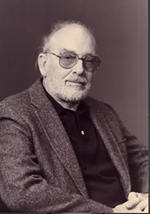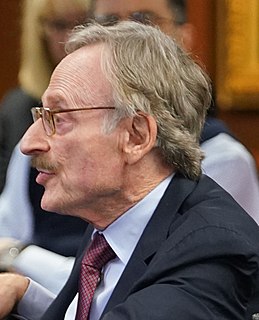Edward James Green (born c. 1947 d. 2019) was an American economist best known for his contributions to the theory of dynamic contracts. Green received his Ph.D. from Carnegie Mellon University in 1977. His dissertation won him the Alexander Henderson Award for excellence in economics. He taught at Princeton University and worked at the Federal Reserve Bank of Minneapolis, and the Federal Reserve Bank of Chicago, and was Professor of Economics at Pennsylvania State University.
Green wrote several influential articles.
In a 1984 article written with Robert Porter published in Econometrica , Green and Porter showed that price wars can periodically occur even among firms that are colluding in an optimal fashion.
In a 1987 contribution ("Lending and the Smoothing of Uninsurable Income"), he studied the optimal consumption allocation that a planner would choose if he could not observe households' income, and that income was uncertain to households. The planner faces a trade-off between insuring households and enticing the households to reveal if they have had high or low income. Green showed that the allocation was related to Milton Friedman's permanent income theory. This contribution is one of the earliest in the economic field of dynamic contracts.

Robert Alexander Mundell, CC is a Canadian economist. Currently, he is a professor of economics at Columbia University and the Chinese University of Hong Kong.
Welfare economics is a branch of economics that uses microeconomic techniques to evaluate well-being (welfare) at the aggregate (economy-wide) level.
Sir James Alexander Mirrlees was a Scottish economist and winner of the 1996 Nobel Memorial Prize in Economic Sciences. He was knighted in the 1997 Birthday Honours.

Edward Christian Prescott is an American economist. He received the Nobel Memorial Prize in Economics in 2004, sharing the award with Finn E. Kydland, "for their contributions to dynamic macroeconomics: the time consistency of economic policy and the driving forces behind business cycles". This research was primarily conducted while both Kydland and Prescott were affiliated with the Graduate School of Industrial Administration at Carnegie Mellon University. According to the IDEAS/RePEc rankings, he is the 19th most widely cited economist in the world today. In August 2014, Prescott was appointed as an Adjunct Distinguished Economic Professor at the Australian National University (ANU) in Canberra, Australia.

Finn Erling Kydland is a Norwegian economist known for his contributions to business cycle theory. He is the Henley Professor of Economics at the University of California, Santa Barbara. He also holds the Richard P. Simmons Distinguished Professorship at the Tepper School of Business of Carnegie Mellon University, where he earned his Ph.D., and a part-time position at the Norwegian School of Economics (NHH). Kydland was a co-recipient of the 2004 Nobel Memorial Prize in Economics, with Edward C. Prescott, "for their contributions to dynamic macroeconomics: the time consistency of economic policy and the driving forces behind business cycles."
Nancy Laura Stokey is the Frederick Henry Prince Distinguished Service Professor of Economics at the University of Chicago where she began in 1990 and focuses particularly on mathematical economics. She earned her BA in economics from the University of Pennsylvania in 1972 and her PhD from Harvard University in 1978, under the direction of thesis advisor Kenneth Arrow. She is a Fellow of the Econometric Society, the American Academy of Arts and Sciences and the National Academy of Sciences. She previously served as a co editor of Econometrica and was a member of the Expert Panel of the Copenhagen Consensus. She received her Honorary Doctor of Laws (L.L.D) in 2012 from the University of Western Ontario. Much of her work has been done by digesting economic dynamics, which most of this work is done as an expositor. She spent a great deal of time recently researching growth theory, economic dynamics, as well as fiscal and monetary policy.

John Brian Taylor is the Mary and Robert Raymond Professor of Economics at Stanford University, and the George P. Shultz Senior Fellow in Economics at Stanford University's Hoover Institution.

Thomas John "Tom" Sargent is an American economist, who is currently the W.R. Berkley Professor of Economics and Business at New York University. He specializes in the fields of macroeconomics, monetary economics and time series econometrics. As of 2014, he ranks fourteenth among the most cited economists in the world. He was awarded the Nobel Memorial Prize in Economics in 2011 together with Christopher A. Sims for their "empirical research on cause and effect in the macroeconomy".
Sanford "Sandy" Jay Grossman is an American economist and hedge fund manager specializing in quantitative finance. Grossman’s research has spanned the analysis of information in securities markets, corporate structure, property rights, and optimal dynamic risk management. He has published widely in leading economic and business journals, including American Economic Review, Journal of Econometrics, Econometrica, and Journal of Finance. His research in macroeconomics, finance, and risk management has earned numerous awards. Grossman is currently Chairman and CEO of QFS Asset Management, an affiliate of which he founded in 1988. QFS Asset Management shut down its sole remaining hedge fund in January 2014.

David Cass was a professor of economics at the University of Pennsylvania, mostly known for his contributions to general equilibrium theory. His most famous work was on the Ramsey–Cass–Koopmans model of economic growth.

Michael Jay Boskin is the T. M. Friedman Professor of Economics and senior Fellow at Stanford University's Hoover Institution. He also is Chief Executive Officer and President of Boskin & Co., an economic consulting company.

Peter Arthur Diamond is an American economist known for his analysis of U.S. Social Security policy and his work as an advisor to the Advisory Council on Social Security in the late 1980s and 1990s. He was awarded the Nobel Memorial Prize in Economic Sciences in 2010, along with Dale T. Mortensen and Christopher A. Pissarides. He is an Institute Professor at the Massachusetts Institute of Technology. On June 6, 2011, he withdrew his nomination to serve on the Federal Reserve's board of governors, citing intractable Republican opposition for 14 months.
In economics, distribution is the way total output, income, or wealth is distributed among individuals or among the factors of production. In general theory and the national income and product accounts, each unit of output corresponds to a unit of income. One use of national accounts is for classifying factor incomes and measuring their respective shares, as in national Income. But, where focus is on income of persons or households, adjustments to the national accounts or other data sources are frequently used. Here, interest is often on the fraction of income going to the top x percent of households, the next x percent, and so forth, and on the factors that might affect them.
Carl Eugene Walsh, is an American economist. He has been an economics professor at the University of California, Santa Cruz since 1987, and Distinguished Professor of Economics and chair of the Economics Department at the university since 2010. He has also served in several positions in the Federal Reserve System.
Dynamic stochastic general equilibrium modeling is a method in macroeconomics that attempts to explain economic phenomena, such as economic growth and business cycles, and the effects of economic policy, through econometric models based on applied general equilibrium theory and microeconomic principles.
Narayana Rao Kocherlakota is an American economist and is the Lionel W. McKenzie Professor of Economics at the University of Rochester. Previously, he served as the 12th president of the Federal Reserve Bank of Minneapolis until December 31, 2015. Appointed in 2009, he joined the Federal Open Markets Committee in 2011. In 2012, he was named one of the top 100 Global Thinkers by Foreign Policy magazine.
Serge-Christophe Kolm is a French economist. His work in economics and related social science includes his analyses, concepts and results in Public Economics and Normative Economics focusing on equality, distributive justice, and efficiency of economic measures, and in other fields and problems often applying them.

Richard Harris Clarida is an American economist and Vice Chairman of the Federal Reserve. He is the C. Lowell Harriss Professor of Economics and International Affairs at Columbia University and, until September 2018, Global Strategic Advisor for PIMCO. He is notable for his contributions to dynamic stochastic general equilibrium theory and international monetary economics. He is a former Assistant Secretary of the Treasury for Economic Policy and is a recipient of the Treasury Medal.
Sudhakar Rao Aiyagari was an Indian-born economics professor at the University of Rochester. He had previous been a leading research economist at the Minneapolis Fed, prior to which he had taught, in the 1980s, at New York University, University of Wisconsin, Madison, and Carnegie-Mellon University in Pittsburgh.
Aiyagari made significant contributions to the economics literature, primarily in the areas of macroeconomics, monetary theory and intertemporal general equilibrium theory. He died of a heart attack while playing tennis aged 45. Aiyagari held a doctorate in economics from the University of Minnesota and master's degrees in economics and physics from Jawaharlal Nehru University in New Delhi and the Indian Institute of Technology, Delhi, India.
Makoto Yano is a Japanese economist, currently the President and Chief Research Officer of the Research Institute of Economy, Trade and Industry. He is also a Professor Emeritus at Kyoto University and a Professor by Special Appointment at Kyoto University's Institute of Economic Research and Sophia University.








